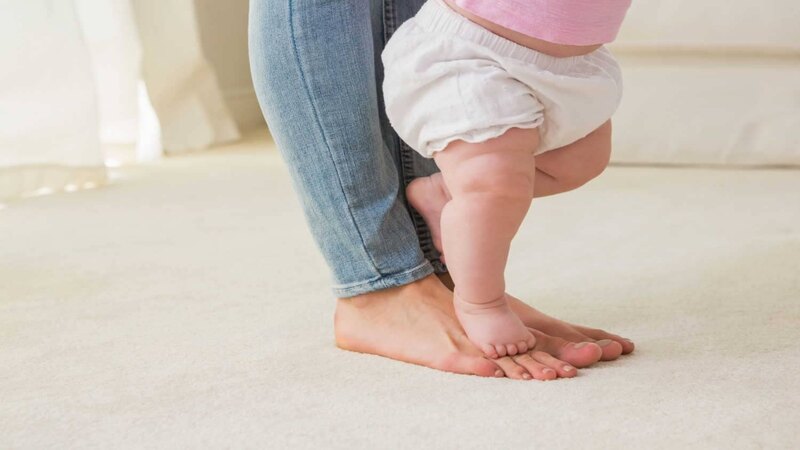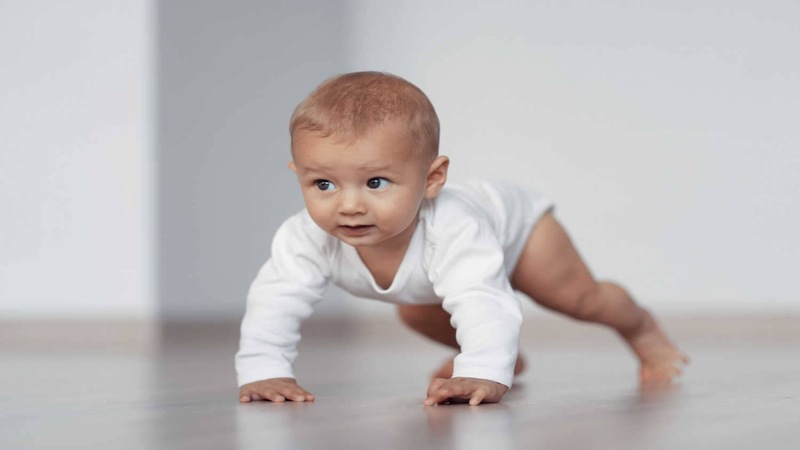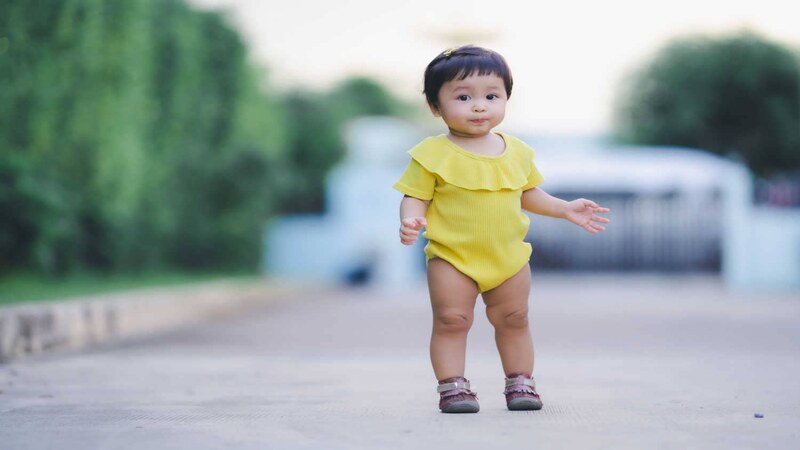
You’re excited and ready to see your baby take their first steps—one of the biggest moments in their early development. While everyone talks about how special that moment is, it’s also helpful to know the signs baby will walk soon. These signs might include your baby pulling up to stand, cruising along furniture, or showing interest in walking with support. Knowing what to look for can help you feel more confident and prepared for this exciting milestone.
Keep your camera nearby, because once your baby starts showing these signs, those first steps might be just days away. Watching your child walk for the first time is a joyful and unforgettable experience. It’s the beginning of a new stage full of movement, discovery, and growth.
At What Age Does A Baby Will Walk?
Typically, babies begin to walk anytime between 9 and 18 months of age (1). Walking is a major developmental milestone after crawling. However, since every baby is different, some may skip the crawling stage altogether after sitting upright and learning to walk directly, while some may take a while before gaining enough confidence to take those valuable first steps.
Your baby’s body builds strength in stages:
-
- 3–5 months: Strong upper body muscles.
- 5–7 months: Growing leg strength.
- 6–9 months: Improved neck, head control, balance, and coordination.
All of these work together to help your baby take those first steps toward becoming a confident walker
A Few Signs That Baby Will Walk Soon

Below are some specific and pointed indications that your baby will walk soon:
1. Crawling Over And Above Furniture
When your child has mastered crawling, and wish to learn and do a lot more than ‘just crawl’, they will become daredevils in their own right. They will climb over furniture and cross as many hurdles as possible – like baby doors and planks. In fact, you will find your baby trying to climb upstairs using their hands.
2. Pulling Up
One of the second most common signs of your baby wanting to walk will be when they start pulling themselves up. They wish to stand and will try to achieve this by pulling up on furniture, holding the railings of their playpen, or even tugging at your feet.
3. Standing Independently

Your baby may be ready to take its first steps if they learn to stand independently, without any support. However, it could take up to a good three months before they take their first steps after they learn to stand independently. When they learn to let go of support, they gain confidence. And the sooner they gain this confidence, the earlier they walk!
4. Transferring Weight Between legs
Once your baby learns to stand independently, they will begin to shift its weight from one foot to the other. This builds muscle strength and boosts their confidence in taking those much-awaited first steps.
5. Cruising
Now that they’ve learned how to transfer weight between their legs, they will soon want to cruise, which means they will begin to walk while holding onto a push-toy or some furniture. This is essential in their forward progression and a big boost to their poise.
How To Encourage Your Baby To Walk

There are some ways in which you can encourage your child to walk:
- Help them balance. You can sit down with your baby and help them to stand up. Then count from the time that they hold their standing position and maintain balance. Needless to say, this must be accompanied by several words of encouragement, claps, and praises!
- Place your baby down on the floor in the standing position, as opposed to the sitting position. This will give them the message that you appreciate standing and walking and balancing!
- Ask your baby to walk up to you. Stand some distance away from your baby and ask them to walk towards you. They may fall during their attempt, but your encouragement will help them cover that distance soon!
How To Help Your Baby Walk Independently

Helping your baby learn to walk independently is a major milestone and an exciting time for both baby and parent. Here are practical, research-backed steps to support this process safely and effectively:
1. Encourage Tummy Time Early On
- Why it’s important: Tummy time helps babies build neck, shoulder, and back strength, which are critical for walking.
- Tip: Start with a few minutes a day and gradually increase as your baby becomes stronger.
2. Let Them Explore Different Types Of Movement
- Crawling, scooting, cruising: Let your baby crawl, scoot, and cruise—these fun moves help build the skills they need to start walking.
- Avoid too much time in containers: Limit the amount of time your baby spends in walkers, bouncers, or jumpers, as these devices can restrict natural movement and potentially delay motor skill development.
3. Create a Safe, Open Space For Your Baby to Practice Walking
It’s okay if your baby falls—that’s how they learn! Make sure your home is childproofed and stay close as they explore. A few stumbles are normal, especially in the first weeks of walking
- Baby-proofing: Remove sharp objects and create an area where your baby can pull up and cruise along furniture.
- Avoid shoes indoors: Let your baby walk barefoot or with grip socks. Shoes are mainly for outdoor protection, not for learning to walk. Barefoot will help babies develop better balance and sensory awareness of the ground.
4. Build Strong Muscles Through Play
- Let your baby squat to pick up toys—it’s great for their muscles.
- Push toys, like sturdy walkers or weighted boxes, can help them practice balance and take those first steps.
5. Help With Standing and Cruising
- Let your baby hold your hands or stable furniture to pull themselves up.
- Help them move safely from one surface to another.
- Encourage cruising by supporting their side steps while they hold on.
6. Practice Standing Balance
- Help your baby stand unsupported for a few seconds at a time.
- You can even make it fun by holding a toy just out of reach to motivate them to stand or move toward it.
7. Encourage First Steps
- Kneel a few feet away and call them to walk to you.
- Hold their hands loosely at first, then reduce support as they gain confidence.
8. Celebrate Their First Steps
Make your baby’s first steps a big deal. Celebrate this milestone and shower ample praises on your little one. This will greatly develop their confidence to walk independently.
When Should To Consider Seeing A Doctor?
If your baby isn’t walking by 18 months, or if you notice asymmetry, stiffness, or weakness in their movements, consult your pediatrician or a pediatric physical therapist. Developmental delays point to different causes which are best treated as early as you can imagine.
As a parent, you shoulder a big responsibility of building your child’s self-confidence and helping them overcome their fears and apprehensions. Hugs, kisses, claps, words of praise and encouragement, and evading comparison of your baby with others can do wonders for your little precious walker!
FAQ’s
1. Are Early Walkers Smarter?
According to research, early walkers are not more advanced or intelligent. Indeed, by the time young children begin school, those who began walking later are just as coordinated and intelligent as those who began earlier.
2. Do Walkers Help Babies Walk?
NO, baby walkers and jumpers do not aid in the development of a baby’s walking. In fact, walkers and jumpers can obstruct or delay your baby’s achievement of these critical milestones.
3. How Long After Pulling Up To Stand Will Baby Walk?
About two to three months after they first learn to stand on their own, most infants begin walking alone.
Reference
- Cleveland Clinic – https://health.clevelandclinic.org/when-do-babies-start-walking
